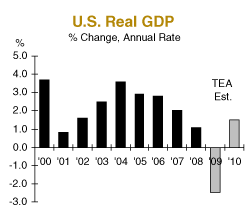Written by Jeff Thredgold, CSP, President, Thredgold Economic Associates
The American Economy
…the recession continues
Domestic and global financial sector paranoia has contributed to major weakness within the U.S. economy. Enormous investment and lending losses have sharply curtailed the availability of credit.

Gross Domestic Product, GDP, Real GDP
Such financial sector weakness has led to creative and extremely costly government proposals to stabilize financial markets. These factors, combined with prior excesses in new home construction and existing home price appreciation, led to the current period of recession.
The official “scorekeeper” of the U.S. economy, the National Bureau of Economic Research, had remained silent in regard to recession…until this week. They announced on Monday that a U.S. recession officially began in December 2007.
Budget Deficits
…off the charts
The combination of serious U.S. recession, enormous war spending, one financial stabilization program after another, and Congressional economic stimulus spending could see the fiscal year (FY) 2009 deficit, which began on October 1, 2008, easily exceed $1 trillion. The budget deficit for FY 2008 was $455 billion, also a record. Note, however, that much of the Government’s investment into major financial institutions will be returned to taxpayers in coming years as financial markets (hopefully) return to some level of normalcy.
Unemployment
…to move higher

Unemployment Rate, U.S. Unemployment Rate
The nation’s jobless rate reached 6.5% in October, a 14-year high. It could reach, and possibly exceed, 7.5% during 2009. By comparison, the jobless rate averaged 4.6% in both 2006 and 2007.
U.S. employment has declined for 10 consecutive months, with nearly 1.2 million fewer jobs today than a year ago. However, longer-term labor shortages, especially for skilled workers, will remain center stage for years to come.
Inflation
…to move lower
The sharp decline in oil and other commodity prices of recent months, should it continue or simply stabilize, will help unwind much of the inflation pressures that pushed inflation (the CPI) to a 16-year high of 4.1% in 2007. Most forecasters expect the CPI to rise roughly 2.0% in 2008, with a slightly smaller increase expected next year. Note that there are as many concerns about deflation during the next few years as about inflation.
The Federal Reserve
…just plain aggressive
The Fed has been a major player in numerous financial stabilization programs announced during the past 16

U.S. Consumer Price Index, CPI, Consumer Price Index
months. As noted above, the sharp decline in inflation pressures provides the Fed “cover” to aggressively use its balance sheet to improve financial flows.
The Fed’s critical federal funds rate, arguably the most important of all interest rates, has been at a 50-year low of 1.00% since late October. Another cut to below 1.00% is likely no later than December 16.
Solid evidence of U.S. financial stabilization and a resumption of modest economic growth during 2009’s second half—the current consensus view of economists—will lead financial markets to expect a minimal reversal of Fed policy late in the year or early in 2010.
Gasoline Prices
…like cutting taxes
Need a bit of “good” economic news? The plunge in gasoline prices from a high of roughly $4.25 per gallon in early July to around $1.65-$1.85 now is the equivalent of a $250 billion tax cut for American consumers. One concern is that prices could go too low…and put prior initiatives regarding developing alternative sources of energy on the “back burner.”
The Global Economy
…more slowing expected
Five years of powerful global economic performance gave way to major slowing during 2008. A global recession during 2009 is likely.
As in the U.S., global financial markets and major financial market players have been decimated by a loss of confidence…the most crucial component of the lending and investing process. If you don’t have confidence in the firms you lend money to, you simply don’t do it…just ask Bear Stearns and Lehman Brothers, now deceased.
Better news? Declines in energy, commodity, and many food costs of recent months have been good news for hundreds of millions of the global poor.
Asian economies are dealing with their own exposure to global financial market distress and slowing global exports, with various nations enacting their own stimulus packages. China’s recently announced $586 billion stimulus program comes to mind. A series of Chinese interest rate cuts have also taken place as this nation faces economic growth that may soon be half its prior blistering pace.
Japan’s economy continues to struggle to regain its 1980s economic magic. Today? Japan is again in recession. As before, the Japanese fear the rising Asian clout of the Chinese.
I have no doubt that European business leaders and politicians were laughing at the U.S. earlier this year for the enormous financial mess we got ourselves into. The laughter ceased when the Europeans soon realized their challenges might surpass our own.
Europe is now dealing with its own recession, with limited prospects for emergence anytime soon. The weakness in home prices in many European nations exceeds that in the U.S., as many communities saw home prices skyrocket earlier in this decade. More interest rate cuts are coming from the European Central Bank.
Russia’s critics have had a field day in response to its aggression into Georgia. The Russians have experienced some of the global community’s most volatile stock market performance, in part tied to the collapse of energy prices.
Oil wealth continues to accumulate across the Persian Gulf. However, many investors are losing sleep because of massive commercial development commitments that were predicated upon oil remaining north of $100 per barrel…whoops.
Major South American nations struggle with much lower energy and commodity prices than their respective budgets assumed. Other nations in the region struggle with high taxes, enormous business red tape, and highly anxious credit markets.
Canada is facing its own possible recession as its major export market…the U.S…struggles with recession. Mexican growth is modest.
The Bottom Line?
U.S. economic recession will hopefully give way to modest growth by mid-year 2009. We also expect: a much larger budget deficit…rising unemployment…declining inflation pressures…record low short-term interest rates…stable energy prices…and a very weak global economy.
Reprinted with permission from the “Tea Leaf” by Jeff Thredgold. Copyright, 2008, Thredgold Economic Associates, LLC. To subscribe to Jeff’s free weekly email update, visit http://www.thredgold.com.”
Visit Economist, Global Futurist, and Keynote Speaker Jeff Thredgold web page to learn more about his programs.
To book Economist, Global Futurist, and Keynote Speaker Jeff Thredgold contact FIVE STAR Business Speakers at 913.648.6480.
 Wouldn’t It Be Nice If…
Wouldn’t It Be Nice If…
 of any since the Great Depression. A renewal of modest (but positive) growth during 2009’s final quarter-the evolving consensus view of forecasting economists-would see the current recession approach 20-24 months in duration, nearly three times the length of the two prior recessions of the early 1990s and in 2001.
of any since the Great Depression. A renewal of modest (but positive) growth during 2009’s final quarter-the evolving consensus view of forecasting economists-would see the current recession approach 20-24 months in duration, nearly three times the length of the two prior recessions of the early 1990s and in 2001.


You must be logged in to post a comment.